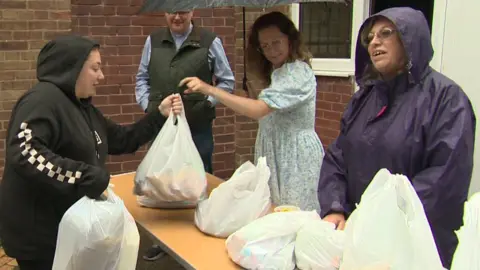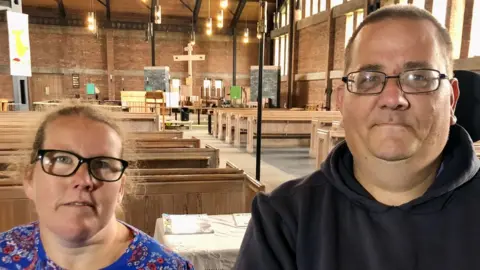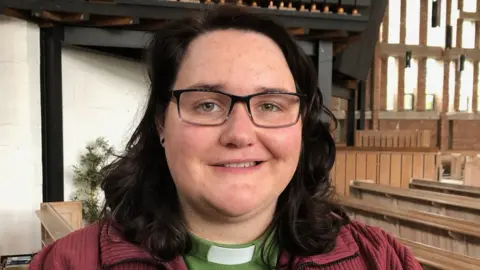Food poverty: Parents dread end of free school meals in holidays
 BBC
BBCNursing a cup of tea in a community cafe run by her local church, a look of panic crosses Katy's face when she starts to talk about the school holidays.
Four of her six children receive free school meals, but this only applies during term-time.
Asked about the summer holidays, she says: "I'm absolutely dreading it to be honest - it's more meals at home.
"It's hard to feed my kids anyway. I use a lot of the foodbanks round here. There's other churches which have said they'll sort me out a food hamper.
"It's degrading because I've been able to feed my kids in the past and now I physically can't.
"This cafe is a lifeline because I can bring my children and we're not judged. Before this opened, I was eating one meal a day.
"Everything's getting harder and harder. My little girl's asking me to go and get her a haircut - I can't afford it."
'Struggling'
Katy, who is in her 30s, is on Universal Credit like the vast majority of people who use the drop-in centres and food clubs organised by a group of churches partnering with local charities in Wythenshawe, south Manchester.
Church leaders say they're seeing an increasing need from struggling families.
Mobile food club The Bread and Butter Thing, hosted by St Luke's Church, now regularly has 80 people queuing through the car park for low-cost weekly shopping bags.
"Every single week we're getting people coming in who don't have enough money to put food on the table," says church outreach worker John Hopkins, packing fresh fruit and vegetables into plastic bags in the church hall.
"These are real people who are really suffering and we see them every single week. Something needs to change."
John is one of the organisers of The Big Feed, a project which has brought Anglican churches in Wythenshawe together to put on huge barbecues, lunches and community picnics in the first two weeks of the summer holidays.
They've started a petition, calling on the government to end food poverty by extending free school meals throughout the summer and raising Universal Credit payments in line with the cost of living.
Churches also want an end to the two-child limit which bars parents from claiming child tax credit or Universal Credit for any third or subsequent child born after April 2017.
"We're saying to the government: 'You've got to help these people out'. That's why we're not only doing these big community events - and feeding people right through the summer - but we've got this campaign element," adds John.
"Given the amount of need there is, there has to be more support and it's got to come from the government."
Wythenshawe has an unemployment rate of 12.8% - more than double the national average, while 15% of the population have no qualifications - double Greater Manchester's as a whole..
At William Temple Church, just over the road from the town's Civic Centre, 90% of the congregation are on Universal Credit.

Ruth and Paul Holden are the church wardens. Both receive the benefit after Paul had an accident at work and Ruth became his full-time carer.
"This campaign is desperately needed," says Ruth. "The politicians think you're frittering benefits away, that you're just making it up, but we're not at all. The cost of food is really hard. An item can cost one pound in the shops one week and then £1.50 the next.
"The government don't get it because they don't live it.
"Providing an extra meal a day for my kids in the holidays when free school meals stop is scary. It's like £50, sometimes £60 extra a week just for that one extra meal.
"Sometimes you don't have anything left a few days before you get your benefits."
Paul adds: "It feels like you're not actually providing properly for your kids. You don't mean to be on Universal Credit. If we could work it would be amazing."

Team Curate Rev Alexa Russell has seen a huge increase in her congregation needing help.
"Whether it's here at William Temple or a church down the road, the parishioners have the same story. It's heartbreaking," she says.
"Food poverty and hunger is so prominent here in Wythenshawe. So we're trying to make this statement as a group of churches, calling on the government to listen."
The Department for Work and Pensions says it knows people are struggling with rising prices and has raised benefits in line with inflation.
It added the two-child policy asks families on benefits to make the same financial decisions as families supporting themselves solely through work and safeguards are in place to protect the most vulnerable.
The Department for Education says it is putting more than £200m of funding a year into the Holiday Activities and Food programme, which provides meals for disadvantaged children for four weeks during the summer.
Katy's name has been changed at her request

Why not follow BBC North West on Facebook, Twitter and Instagram? You can also send story ideas to [email protected]
